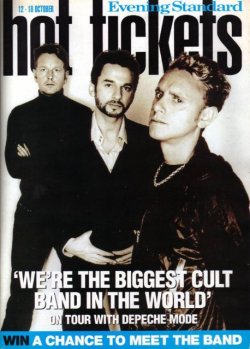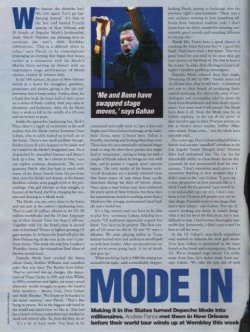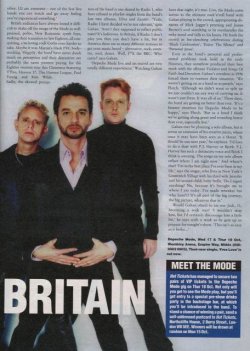- Joined
- Aug 15, 2019
- Messages
- 7,493
- Reaction score
- 143
- Points
- 63
Mode in Britain
[Hot Tickets, 12th-18th October 2001. Words: Andrew Panos. Pictures: Anton Corbijn / Tibor Illyes.]
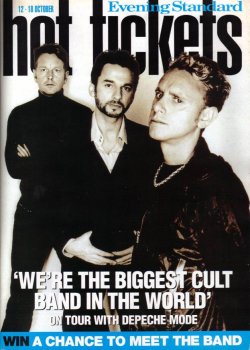
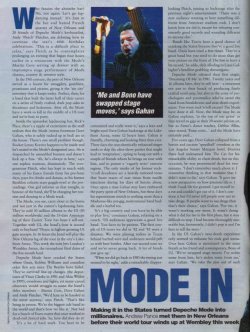
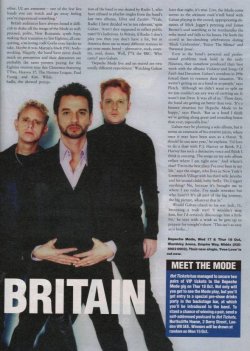
“Who fancies the absinthe bar? No, not again. Let’s go lap-dancing instead.” It’s 2am in the hot and humid French quarter of New Orleans and 20 friends of Depeche Mode’s keyboardist, Andy “Fletch” Fletcher, are debating how to continue the star’s 40th birthday celebrations. “This is a difficult place to relax,” says Fletch as he contemplates prolonging an evening that began four hours earlier in a restaurant with the Mode’s Martin Gore serving up dessert with an impromptu stage performance of Mode classics, country & western style. [1]
In the 19th century, the port of New Orleans served as a haunt for smugglers, gamblers, prostitutes and pirates, giving it the “sin city” notoriety that keeps it today. Perfect, then, for a band that built the latter half of their career on a series of finely crafted, dark pop odes to decadence and hedonism. After all, the Mode have a week to kill in the middle of a US tour and we’re here to party.
Inside the upmarket lapdancing bar, Rick’s Place, there’s a ripple of excitement as the staff realise that the Mode (minus frontman Dave Gahan, who is safely tucked up in bed) are in the house. There’s one small problem though. Rocker Lenny Kravitz happens to be inside and he’s seated in the Mode’s designated area. He is despatched by assembled barmen and doesn’t kick up a fuss. “Ah, he’s always in here,” says one topless waitress, dismissively. The ever-generous Fletch, who has kept in touch with many of his Essex friends from his pre-fame days, pays for drinks and dances, as his former Basildon cohorts stare goggle-eyed at the proceedings. One girl informs us that tonight, in honour of the band, she’ll be changing her routine and dancing to a Mode track.
The Mode, you see, carry clout in the States and not just in the nation’s lapdancing bars. They’ve sold 30 million albums in the US (50 million worldwide) and the 33-date American leg of their Exciter Tour has been a sell-out. Together with U2, the band’s tour is second only to boyband ’Nsync in highest grossing US gate receipts. In 16 hours the band will play the New Orleans leg of the tour at the city’s Lakefront Arena. This week the tour hits London’s Wembley Arena, the triumphant final dates of the five-month haul.
Depeche Mode have cracked the States where Oasis, Robbie Williams and countless other Brit acts since The Beatles have failed. They’ve survived line-up changes (the departures of Vince Clarke in 1981 and Alan Wilder in 1995), overdoses and fights, yet many casual observers would struggle to name the band’s three members – Martin Gore, Dave Gahan and Andy Fletcher. “We’d hate to be hassled in the street anyway,” says Fletch. “That’s like being in prison. We’re the biggest cult band in the world and that’s how we like it.” [2] Not bad for a bunch of Essex mates that once worked in dead-end clerical jobs. So, how did they do it?
“It’s a lot of hard work. You have to be committed and really want it,” says a lean and bright-eyed Dave Gahan backstage at the Lakefront Arena, some 12 hours later. Gahan is friendly, charming and looking fitter than ever. These days the non-chemically enhanced singer tends to skip the after-show parties that might lead to “temptation”, opting to hang out with a couple of friends whom he brings on tour with him, and to pursue a “vaguely strict” exercise regime. The only marks of his former rock’n’roll decadence are a heavily tattooed torso that bears traces of scar tissue from needle injections during his days of heroin abuse. Once upon a time Gahan may have embraced the party spirit of New Orleans, but these days his superstitions stretch to nothing more than a Madonna-like pre-gig, motivational band huddle and a herbal tea.
“It’s a big country and you have to be able to play live,” continues Gahan, relaxing on a couch. “US audiences appreciate a good live band. You have to be patient. The first couple of US tours we did in ’82 and ’83 were a disaster. We were playing toilets in Texas behind barbed wire and audiences would pelt us with beer bottles. After our second tour we said we’re never going back. A lot of bands just give up.”
“When we did go back in 1985 the timing just seemed to be right,” adds a remarkably chipper-looking Fletch, joining us backstage after the previous night’s entertainment. “There was a new audience wanting to hear something different from American stadium rock. I don’t know how we did it, except for releasing consistently good records and sounding different to anyone else.”
“Bands like Travis have a good chance of cracking the States because they’re a good live band. Oasis have tried a few times. They’re a great band but you need to do more than get your picture on the front of The Sun to have a hit record,” he adds, slyly alluding to Liam Gallagher’s headline-grabbing shenanigans.
[Hot Tickets, 12th-18th October 2001. Words: Andrew Panos. Pictures: Anton Corbijn / Tibor Illyes.]
Basic article in a London entertainment guide giving an introduction to Depeche Mode for the casual reader. It gives an overview of their career while Dave and Andy reflect on their success in America and relative misconception in the UK. Simple, but notably balanced in tone.
" Happily, the band have never dwelt much on perception and their detractors are probably the same punters paying for the Eighties reunion tour this Christmas featuring T’Pau, Heaven 17, The Human League, Paul Young and Kim Wilde. Sadly, the skewed perception of the band is one shared by Radio 1, who have refused to playlist singles from the band’s last two albums, Ultra and Exciter. "



“Who fancies the absinthe bar? No, not again. Let’s go lap-dancing instead.” It’s 2am in the hot and humid French quarter of New Orleans and 20 friends of Depeche Mode’s keyboardist, Andy “Fletch” Fletcher, are debating how to continue the star’s 40th birthday celebrations. “This is a difficult place to relax,” says Fletch as he contemplates prolonging an evening that began four hours earlier in a restaurant with the Mode’s Martin Gore serving up dessert with an impromptu stage performance of Mode classics, country & western style. [1]
In the 19th century, the port of New Orleans served as a haunt for smugglers, gamblers, prostitutes and pirates, giving it the “sin city” notoriety that keeps it today. Perfect, then, for a band that built the latter half of their career on a series of finely crafted, dark pop odes to decadence and hedonism. After all, the Mode have a week to kill in the middle of a US tour and we’re here to party.
Inside the upmarket lapdancing bar, Rick’s Place, there’s a ripple of excitement as the staff realise that the Mode (minus frontman Dave Gahan, who is safely tucked up in bed) are in the house. There’s one small problem though. Rocker Lenny Kravitz happens to be inside and he’s seated in the Mode’s designated area. He is despatched by assembled barmen and doesn’t kick up a fuss. “Ah, he’s always in here,” says one topless waitress, dismissively. The ever-generous Fletch, who has kept in touch with many of his Essex friends from his pre-fame days, pays for drinks and dances, as his former Basildon cohorts stare goggle-eyed at the proceedings. One girl informs us that tonight, in honour of the band, she’ll be changing her routine and dancing to a Mode track.
The Mode, you see, carry clout in the States and not just in the nation’s lapdancing bars. They’ve sold 30 million albums in the US (50 million worldwide) and the 33-date American leg of their Exciter Tour has been a sell-out. Together with U2, the band’s tour is second only to boyband ’Nsync in highest grossing US gate receipts. In 16 hours the band will play the New Orleans leg of the tour at the city’s Lakefront Arena. This week the tour hits London’s Wembley Arena, the triumphant final dates of the five-month haul.
Depeche Mode have cracked the States where Oasis, Robbie Williams and countless other Brit acts since The Beatles have failed. They’ve survived line-up changes (the departures of Vince Clarke in 1981 and Alan Wilder in 1995), overdoses and fights, yet many casual observers would struggle to name the band’s three members – Martin Gore, Dave Gahan and Andy Fletcher. “We’d hate to be hassled in the street anyway,” says Fletch. “That’s like being in prison. We’re the biggest cult band in the world and that’s how we like it.” [2] Not bad for a bunch of Essex mates that once worked in dead-end clerical jobs. So, how did they do it?
“It’s a lot of hard work. You have to be committed and really want it,” says a lean and bright-eyed Dave Gahan backstage at the Lakefront Arena, some 12 hours later. Gahan is friendly, charming and looking fitter than ever. These days the non-chemically enhanced singer tends to skip the after-show parties that might lead to “temptation”, opting to hang out with a couple of friends whom he brings on tour with him, and to pursue a “vaguely strict” exercise regime. The only marks of his former rock’n’roll decadence are a heavily tattooed torso that bears traces of scar tissue from needle injections during his days of heroin abuse. Once upon a time Gahan may have embraced the party spirit of New Orleans, but these days his superstitions stretch to nothing more than a Madonna-like pre-gig, motivational band huddle and a herbal tea.
“It’s a big country and you have to be able to play live,” continues Gahan, relaxing on a couch. “US audiences appreciate a good live band. You have to be patient. The first couple of US tours we did in ’82 and ’83 were a disaster. We were playing toilets in Texas behind barbed wire and audiences would pelt us with beer bottles. After our second tour we said we’re never going back. A lot of bands just give up.”
“When we did go back in 1985 the timing just seemed to be right,” adds a remarkably chipper-looking Fletch, joining us backstage after the previous night’s entertainment. “There was a new audience wanting to hear something different from American stadium rock. I don’t know how we did it, except for releasing consistently good records and sounding different to anyone else.”
“Bands like Travis have a good chance of cracking the States because they’re a good live band. Oasis have tried a few times. They’re a great band but you need to do more than get your picture on the front of The Sun to have a hit record,” he adds, slyly alluding to Liam Gallagher’s headline-grabbing shenanigans.
[1] - Martin has a bit of a habit of this - try this article where he's at it again. There's even a bootleg in existence of an impromptu piano session in a Cologne hotel bar during the Singles 86>98 tour.
[2] - The band have an uncanny knack of not being recognised, this article elaborates on that aspect of Depeche Mode.Depeche Mode - The Basildon Bond (The Times Magazine, 2001)
THE BASILDON BOND [The Times Magazine, 14th April 2001. Words: Paul Connolly. Pictures: Anton Corbijn.] Compelling and balanced article with contributions from all band members telling the band's story and promoting Exciter. It's refreshing to see more from Martin and Andy, who bounce off each...dmremix.pro
Depeche Mode - Blank Celebration (Revolver, 2001)
Blank Celebration [Revolver, May 2001. Words: J. D. Considine. Pictures: Anton Corbijn.] Easy-reading article in a US magazine surrounding the release of Exciter. The author muses on their rise to fame in the USA, the origins of their style, and the bizarre way in which the band members...dmremix.pro
Last edited:

